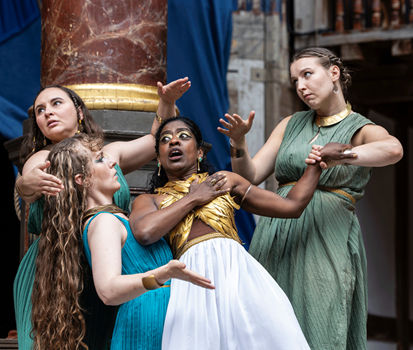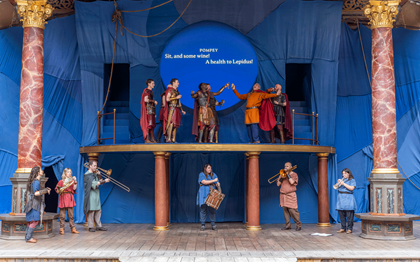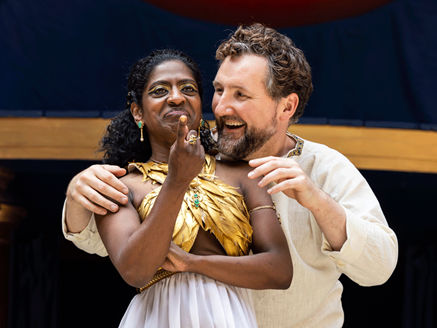More surely than any other London stage, the Globe has opened up our theatrical perspective on different languages. Its triumphant “Globe to Globe” 2012 season presented the Shakespeare canon in 37 different linguistic interpretations.
Among those varied treats from, literally, across the globe, the British Sign Language (BSL) production of Love’s Labour’s Lost, from London’s Deafinitely Theatre, was the only one that did not cross national borders; instead, it crossed the boundaries of theatre itself.
It’s a direction that the Globe has continued to explore over the years, with the opening show of Michelle Terry’s tenure, the 2019 As You Like It, featuring D/deaf performer Nadia Nadarajah as Celia. I recall her definite expressiveness – the character’s rapier wit was certainly apparent – while noting a loss to the audience, given that no interpretation was offered.
So it’s a genuine first that this bilingual Antony and Cleopatra has (loosely) the Egyptian characters performing – and that is the word! – in BSL, while their Roman counterparts play in spoken English. And towering over it, just as her Egyptian queen does over the action, is Nadarajah, glorious in the distaff title role, with a grandeur of command, and humour in execution, that reveals a familiar text anew. We appreciate how that new element of “seeing” a performance adds a different dimension to an experience usually, surely, more conditioned by our “hearing” of it.
 It rebalances our perception of how we absorb the theatrical moment. The Globe has done an exemplary job in its surtitling: a main circular screen projects titles at the back of the stage, supported by two smaller screens on either side, making the text visible to all (more on the expressive variations of that presentation later). That means that viewers with little or no knowledge of BSL, as well as those who don’t keep the full text in their heads – so, all of us, basically – will be juggling just what registers, and when. Does our vision dart to the surtitles, and then move to the gestures, or the other way around? Or, rather, some combination of the two, a process that grows more fluent as the experience absorbs us?
It rebalances our perception of how we absorb the theatrical moment. The Globe has done an exemplary job in its surtitling: a main circular screen projects titles at the back of the stage, supported by two smaller screens on either side, making the text visible to all (more on the expressive variations of that presentation later). That means that viewers with little or no knowledge of BSL, as well as those who don’t keep the full text in their heads – so, all of us, basically – will be juggling just what registers, and when. Does our vision dart to the surtitles, and then move to the gestures, or the other way around? Or, rather, some combination of the two, a process that grows more fluent as the experience absorbs us?
The sign language elements certainly bring home the play’s traditional juxtaposition of Egypt as the locus of the feminine, of mystery, set against the masculine power embodied by Rome. And from first to last, it’s Egypt, and its female world, that’s memorable, with moments of elaborate gesture that become almost mini-tableaux in themselves. Rome, and the machinations of its males, is pale by comparison, more posturing at power than power itself (those scenes just need more confidence, perhaps they will develop that as the run continues).
John Hollingworth as Antony has the physique for the role, and grows considerably in stature as the play proceeds, approaching a final grandeur. But the imbalance between the title characters at the opening remains firmly in Cleopatra’s favour. How could it be otherwise, when her performance’s sheer seductive magic, her camp (in Susan Sontag’s interpretation, “a sensibility that revels in artifice, stylisation, theatricalisation, irony, playfulness, and exaggeration rather than content”) is so alluring? Her attendants, led by Zoë McWhinney’s Charmian, and supporting players, like Nadeem Islam as the ill-fated messenger, and William Grint as the Soothsayer, are similarly expressive (pictured above). The division between these two worlds, these two languages, is never absolute, however. The Romans who have sojourned in Egypt with their master have adopted BSL as a language of “interpretation”, even Daniel Millar’s blunt, Northern-accented Enobarbus, who’s the most impressive of the Roman crew. Antony delivers his glorious dying words in sign language (to match Shakespeare’s poetry, that speech inspired one of the great poems in the English language of the last century, Louis MacNiece’s “The Sunlight on the Garden”). For Cleopatra’s last speech, Nadia Nadarajah interpolates some elements into sound, in grunts of harshly mixed sadness and anger, the only instance in the play that she moves into a semi-vocal range.
The division between these two worlds, these two languages, is never absolute, however. The Romans who have sojourned in Egypt with their master have adopted BSL as a language of “interpretation”, even Daniel Millar’s blunt, Northern-accented Enobarbus, who’s the most impressive of the Roman crew. Antony delivers his glorious dying words in sign language (to match Shakespeare’s poetry, that speech inspired one of the great poems in the English language of the last century, Louis MacNiece’s “The Sunlight on the Garden”). For Cleopatra’s last speech, Nadia Nadarajah interpolates some elements into sound, in grunts of harshly mixed sadness and anger, the only instance in the play that she moves into a semi-vocal range.
It’s an emotional spectrum that dwarves that of Rome. As Octavius, Bert Seymour has a lot of growing up to do, with a callowness that may indeed be part of the role, while Peter Landi’s Lepidus is at best tepid, with even the humour underplayed. Gabriella Leon’s Octavia barely registers against her doublings as Iras and Thyreus. For the paucity of Rome’s language, set against the luxuriance of Egypt, little speaks better (not least as a new “word of the day”) than “garboils”, so memorably attributed to the absent (fatefully deceased) Fulvia.
The production itself, from director Blanche McIntyre, working with associate Charlotte Arrowsmith (herself deaf, Arrowsmith's contribution was clearly crucial) feels distinctly on the Roman side. Simon Daw’s design is dominated by a deep blue back canvas, moderated by a central orange sun on which the surtitles are projected, its colours changing to reflect the speakers (a lovely touch, too that in the death speeches, the titles sprinkle into nothingness).
Tim Sutton’s score seems similarly restrained, defined most of all by Letty Stott’s horn, paired with all sorts of ancient horn (you’ll need a horn expert to define their exact varieties). The musical effect fell particularly short, given that there was brass support too, at that wonderful late moment when Antony, in Alexandria on the eve of his final battle, is abandoned by his protector gods (another great poem from a century ago, this time in Greek, Cavafy’s “The God Abandons Antony”, catches that beautifully). That sense of an “invisible procession going by/with exquisite music, voices” was just not there. The battle scenes, too, felt underwhelming.
But that, really, was not the point here. The production may be competent, but its insight is far more. How potently it revealed to us that “the time for words” is not everything, that “eternity” can be “in our lips and eyes”. Somehow, not least for its volunteer ushers, the Globe has always felt the most welcoming of London’s theatres, never more so than at this premiere. The final hands raised in applause, both those in traditional clapping, and those raised open in sign language acclaim, proved that amply.















Add comment